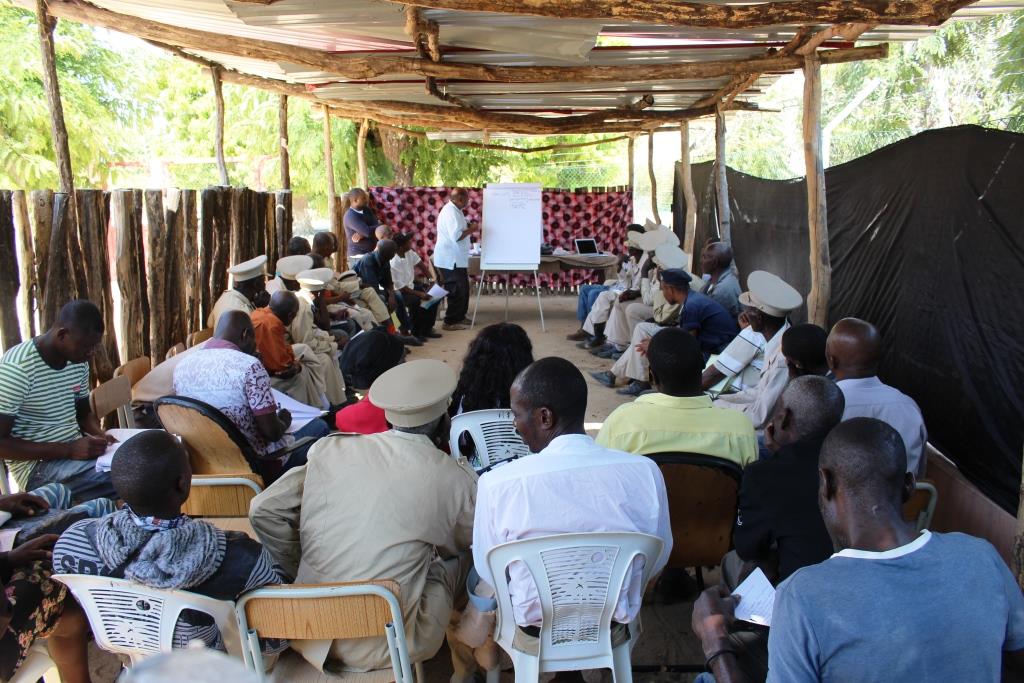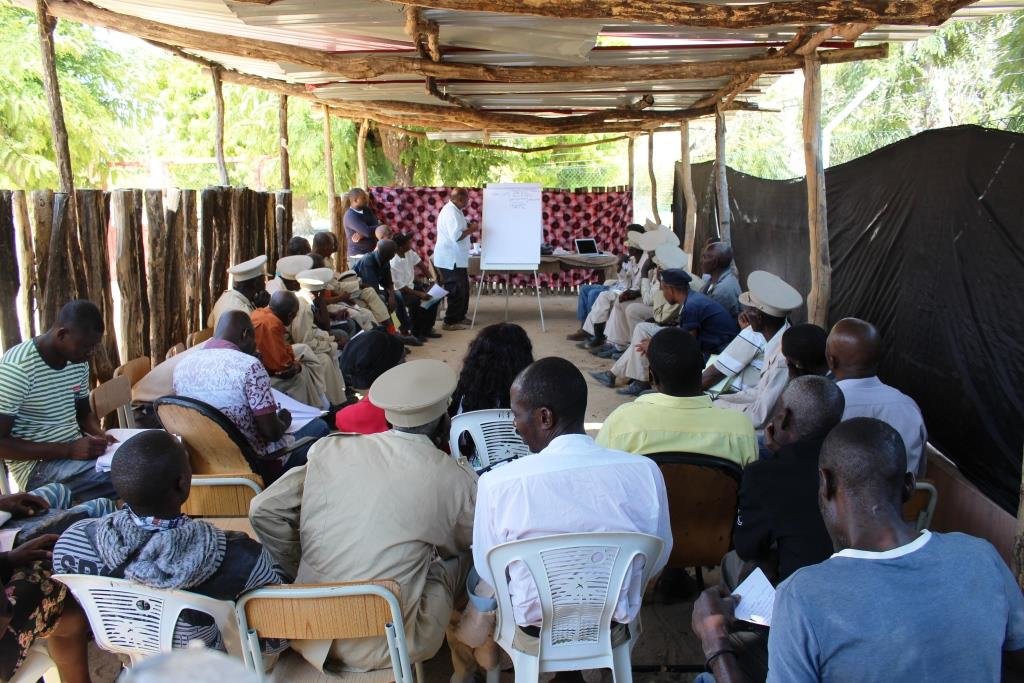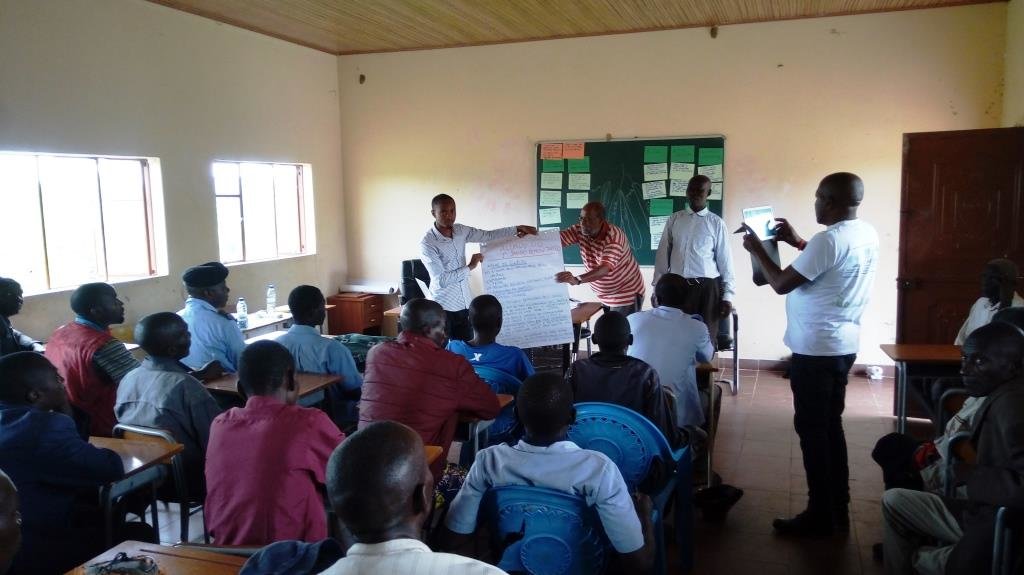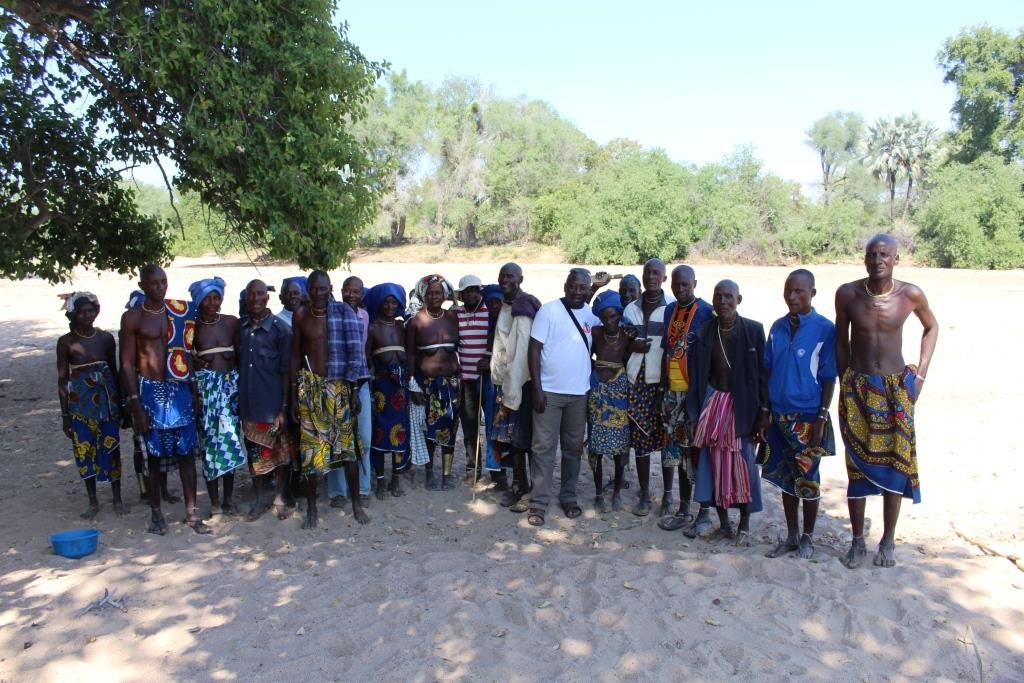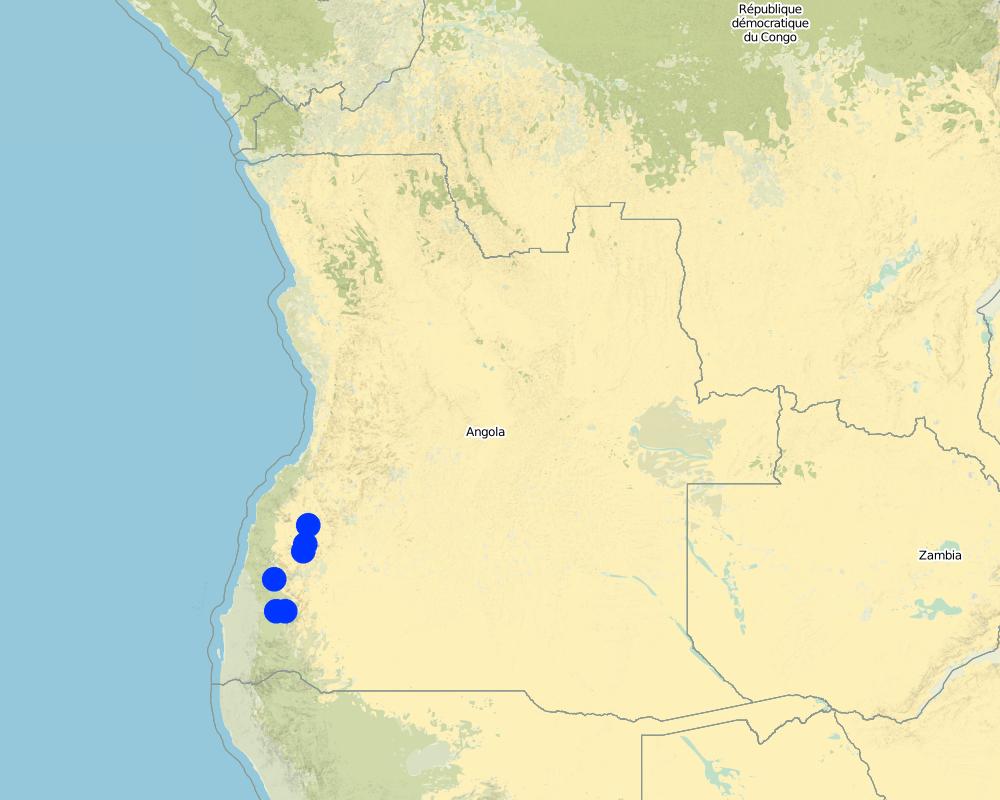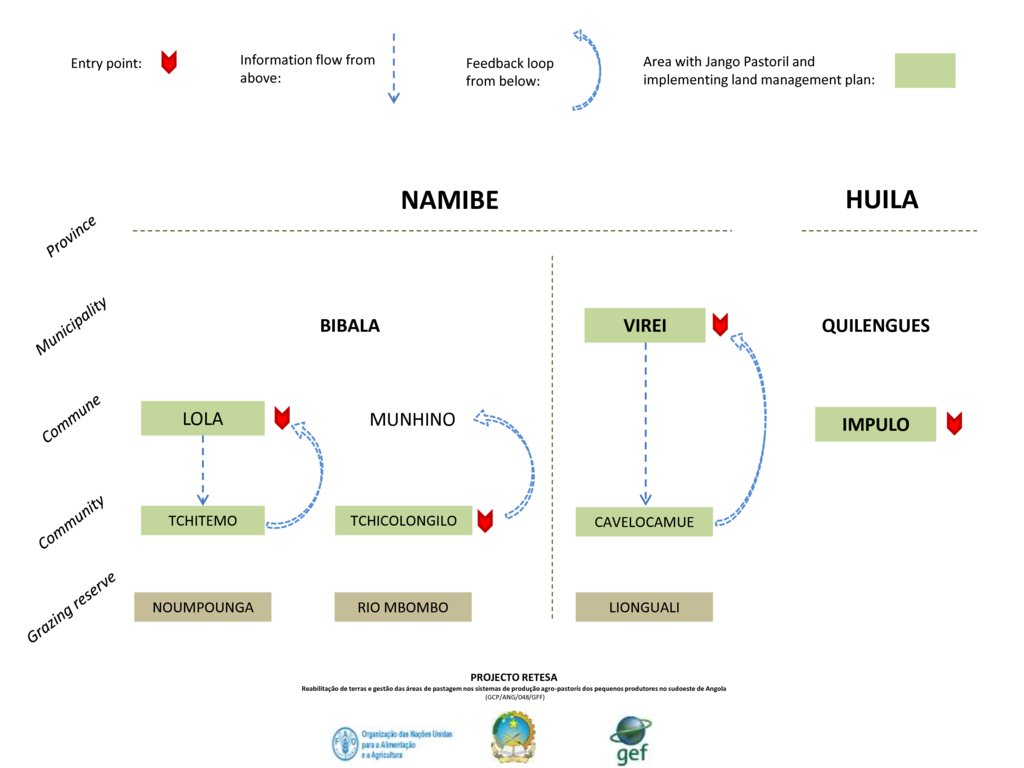Restoration of traditional pastoral management forums [แองโกลา]
- ผู้สร้างสรรค์:
- การอัพเดท:
- ผู้รวบรวม: Nicholas Euan Sharpe
- ผู้เรียบเรียง: David Tarrason, Txaran Basterrechea
- ผู้ตรวจสอบ: Rima Mekdaschi Studer
Jangos Pastoris
approaches_3173 - แองโกลา
- บทสรุปทั้งหมดในรูปแบบของ PDF
- บทสรุปทั้งหมดในรูปแบบของ PDF เพื่อพิมพ์
- บทสรุปทั้งหมดในรูปหน้าเว็บ
- บทสรุปทั้งหมด (ไม่มีการจัดเรียง)
- Restoration of traditional pastoral management forums: 29 มกราคม 2018 (inactive)
- Restoration of traditional pastoral management forums: 16 กุมภาพันธ์ 2018 (inactive)
- Restoration of traditional pastoral management forums: 12 กรกฎาคม 2018 (inactive)
- Restoration of traditional pastoral management forums: 2 พฤศจิกายน 2021 (public)
ดูส่วนย่อย
ขยายทั้งหมด ย่อทั้งหมด1. ข้อมูลทั่วไป
1.2 รายละเอียดที่ติดต่อได้ของผู้รวบรวมและองค์กรที่เกี่ยวข้องในการประเมินและการจัดเตรียมทำเอกสารของแนวทาง
ผู้เชี่ยวชาญ SLM:
ชื่อของโครงการซึ่งอำนวยความสะดวกในการทำเอกสารหรือการประเมินแนวทาง (ถ้าเกี่ยวข้อง)
Reabilitação de terras e gestão das áreas de pastagem nos sistemas de produção agro-pastoris dos pequenos produtores no sudoeste de Angola (RETESA)ชื่อของโครงการซึ่งอำนวยความสะดวกในการทำเอกสารหรือการประเมินแนวทาง (ถ้าเกี่ยวข้อง)
FAO Angola (FAO Angola) - แองโกลา1.3 เงื่อนไขที่เกี่ยวข้องกับการใช้ข้อมูลที่ได้บันทึกไว้ผ่านทาง WOCAT
วันที่เก็บรวบรวมข้อมูล (ภาคสนาม):
21/12/2017
ผู้รวบรวมและวิทยากรหลักยอมรับเงื่อนไขเกี่ยวกับการใช้ข้อมูลที่ถูกบันทึกผ่านทาง WOCAT:
ใช่
2. คำอธิบายของแนวทาง SLM
2.1 การอธิบายแบบสั้น ๆ ของแนวทาง
The transhumance pastoral communities of Southern Angola traditionally held gatherings of chieftains and community leaders to discuss and manage commonly held pastoral resources; however, the conflicts of the last century led to the breakdown in traditional governance and the majority of the traditional management systems were abandoned. The RETESA Project has supported their recovery as a way to reduce land degradation and improve local livelihoods.
2.2 การอธิบายอย่างละเอียดของแนวทาง
การอธิบายอย่างละเอียดของแนวทาง:
The Approach was developed and implemented through the RETESA Project “Land rehabilitation and rangelands management in smallholders agro-pastoral production systems in south western Angola”, which is a project owned and implemented by the Ministry of Environment of the Government of Angola with technical and methodological assistance from The Food and Agriculture Organization of the United Nations (FAO) and financed by the Global Environmental Found (GEF).
From an early stage, the RETESA Project identified 'management' as the most effective tool to improve pastoral livelihoods and to reduce land degradation over large areas of land. However, the management terms and concepts used in conventional western cultures were difficult to convey to the pastoral communities and communication of the needs and methods of proper grazing management were not fully understood and led to confusion. After struggling initially with these challenges, the project technicians responsible for rangeland improvement and rehabilitation began the investigate the traditional management systems in place before the armed conflicts took place and found that they adapted to modern rangeland management theory and practice and had a rich vocabulary which described in detail the timing and movements of the herds. Rather than teach a new way of viewing the natural world, the project's objective became one of reinstitutionalising these lost systems and recuperating what was in the communities' words 'the ways of our elders'. In order to provide an underlying methodological basis which guided the process, the Green Negotiated Territorial Development (GreeNTD) methodology was introduced and used to negotiate the terms and agreements of the 6 management plans created and implemented through the process.
In essence, the role of the traditional management systems was to keep the animals in more remote, mountainous areas during the rainy season, the only time of year when water is available in these areas, and slowly bring them back to the lowland, river plains during the dry season. This simple system also allowed for rangeland recovery and rest and for agriculture to be practiced on the lowlands during the rainy season without the threat of intrusion by livestock, something which is a constant source of conflict within the communities. The periods of 'recovery and rest' of the different areas also meant that important grasses and forage plants could grow, produce seed and multiply, something which was not occurring under previous management, where the animals were free to roam where they wished, returning to the same areas day after day and reducing ground cover to a bare minimum.
The modern discussion forums, or 'Jangos', are still traditional affairs run by traditional authorities and representatives from the communities, but they have adapted to include local Administrations and their technicians, as well as veterinarians, church leaders, NGOs, ranchers and farmers, so as to involve a broader range of stakeholders. The addition of these stakeholders and their involvement and approval of the decisions that come out of the forums are seen as key to the survival and effectiveness of the management plans implemented.
2.3 รูปภาพของแนวทาง
2.5 ประเทศ ภูมิภาค หรือสถานที่ตั้งที่ได้นำแนวทางไปใช้
ประเทศ:
แองโกลา
ภูมิภาค/รัฐ/จังหวัด: :
Province of Namibe and Huila
ข้อมูลเฉพาะเพิ่มเติมของสถานที่ตั้ง:
Municipalities of Bibala, Virei and Quilengues
Map
×2.6 วันที่เริ่มต้นและสิ้นสุดของแนวทาง
ระบุปีที่เริ่ม:
2015
ถ้าไม่รู้ปีที่แน่นอนให้ประมาณวันที่ที่ริเริ่มใช้แนวทางนี้ :
น้อยกว่า 10 ปี (เร็วๆนี้)
ความคิดเห็น:
The Project held its first Jango in December of 2015 and a total of 14 Jangos had been celebrated by the end of the project in April 2018.
2.7 ประเภทของแนวทาง
- The approach relies on a combination of Traditional Inputs and the RETESA Project support
2.8 เป้าหมายหรือวัตถุประสงค์หลักของแนวทาง
Establish Jango Pastoril as institutions in strategic areas and use GreeNTD methodology to develop and implement 6 natural resource management plans that address the causes of land degradation and improve production and local livelihoods.
2.9 เงื่อนไขที่เอื้ออำนวยหรือเป็นอุปสรรคต่อการนำเทคโนโลยีภายใต้แนวทางนี้ไปปฏิบัติใช้
บรรทัดฐานและค่านิยมทางสังคม วัฒนธรรม ศาสนา
- เอื้ออำนวย
There is a clear understanding of the benefits of recuperating the traditional social structures and management systems.
- เป็นอุปสรรค
Current cultural norms and socio-polictical systems hinder the recuperation of the traditional systems as they originally were; therefore, adaptations should be made to make them viable under current conditions.
การมีไว้ให้หรือการเข้าถึงแหล่งการเงินและบริการ
- เป็นอุปสรรค
The project ends in April 2018, whereby the Jangos must be self-sufficient and self-operating. Given the current economic crisis, this will be a challenge.
การจัดตั้งระดับองค์กร
- เอื้ออำนวย
Most of the Municipal governments and community leaders involved have invested in the approach and wish to continue with the forums.
- เป็นอุปสรรค
Pastoral, nomadic livestyles are seen as a threat to education and prosperity by some institutions operating in the country, and the forums could be seen as a way of preserving pastoral culture.
การร่วมมือหรือการทำงานประสานกันของผู้ลงมือปฏิบัติ
- เอื้ออำนวย
The pastoral communities are fully aware of the land degradation and challenges they face and see the Jango Pastoril forums as a way to address these challenges.
- เป็นอุปสรรค
Communication has improved through the forum structure, though collaboration within communities for common benefit is still on the whole uncommon and could threaten the sustainability of the plans agreed upon by the forums. Some communities also fear that improvements in land productivity or infrastructure could lead to land being seized by more powerful actors.
กรอบแนวทางในการดำเนินการด้านกฎหมาย (การถือครองที่ดิน สิทธิในการใช้ที่ดินและน้ำ)
- เป็นอุปสรรค
Land and water rights were not addressed during the forums and are still unclear in the majority of places these forums are operating. The land management plans were based on maintaining the 'status quo' currently operating in the area.
นโยบาย
- เอื้ออำนวย
The RETESA Project has succeeded in presenting traditional livestock management and transhumance movements in a positive light and is working with the Angolan Government to improve policies directed at livestock and herder movement throughout the transhumance migration routes, at community, regional and national levels.
- เป็นอุปสรรค
Pastoral cultures are still seen by many in power as a threat to education and economic prosperity.
การกำกับดูแลที่ดิน (การตัดสินใจ การนำเอาไปปฏิบัติใช้ และการบังคับใช้)
- เป็นอุปสรรค
There still remains much to be done in the area of Land Goverance, from decision-making, implementation and especially enforcement.
ความรู้เกี่ยวกับ SLM การเข้าถึงการสนับสนุนด้านเทคนิค
- เป็นอุปสรรค
Very little is known about SLM and technical support is lacking at a community and municipal levels.
ตลาด (จัดซื้อปัจจัยนำเข้า ขายผลิตภัณฑ์) และราคา
- เป็นอุปสรรค
The more traditional tribes rarely sell their animals to local markets, leading critics to claim that their way of life contributes little to the local or national economies.
ปริมาณงานที่ทำได้ กำลังคนที่มีให้
- เอื้ออำนวย
There is a vast pool of young people able to work.
- เป็นอุปสรรค
Manual labour is most often carried out by the women of the family, while those under 18 are responsible for caring for the animals and following them on their daily search for pasture and water.
3. การมีส่วนร่วมและบทบาทของผู้มีส่วนได้ส่วนเสียที่เกี่ยวข้อง
3.1 ผู้มีส่วนได้ส่วนเสียที่เกี่ยวข้องในแนวทางนี้และบทบาท
- ผู้ใช้ที่ดินระดับท้องถิ่นหรือชุมชนระดับท้องถิ่น
Originally it was just the community chiefs and respected livestock producers who took part in the Jango Pastoril meetings, though the modern version also includes Administrators and their staff, Administrative technicians, veterinarians, ranchers, church leaders, NGOs and farmers.
Given that its the local land users and communities who manage the land on a daily basis, it is their role to fully understand the issues being debated and how the new management plans will affect them. This is usually done through a community Jango Pastoril forum run by the Project and traditional leaders who participate in the Municipal Forums, with the support of the local Administrations. In the community Jango Pastoril, the decisions taken at a Muncipal level are presented, opinions are expressed and the plans are modified or agreed upon. Community feedback is then presented by the traditional leaders at the next Municipal Jango Pastoril where it is recorded and taken into consideration, with the necessary adaptations being introduced.
- องค์กรที่ขึ้นอยู่กับชุมชน
Agropastoral Farmer Field School (APFS) Facilitatores and Members.
Representatives from the Agricultural Development Iniciatives.
Local Church Representatives.
The community based organisations participate in the discussions and speak for those they represent. Many times they are often the ones who support the Administrations in the communication or implementation of the decisions made in the forums.
- ผู้เชี่ยวชาญ SLM หรือที่ปรึกษาการเกษตร
FAO national and international Consultants.
Administrative agricultural and livestock technicians
Veterinarians and Animal Health Workers.
Provide technical support to discussions and provide feedback on local issues.
- องค์กรพัฒนาเอกชน
Local and National NGOs.
Their role will most likely depend on the objectives of the participant NGO, but often lines of collaboration are easily established.
- ภาคเอกชน
Representitives from local ranches and private holdings.
Often the owners are far from the land, and send their local managers to participate, though they have often have little decision-making capacity. However, their presence and opinion should be sought.
- รัฐบาลระดับท้องถิ่น
Municipal and Communal Administrations and their representittives.
Co-coordinate the organisation and logistics of the Jango Pastoril forums. Participate as a stakeholder in the meetings and give feedback and administrative approval of the decisions taken. The Municipal and Communal Administrations usually have the final word on any decisions made so they must actively participate in the meetings.
- องค์การระหว่างประเทศ
Project 'RETESA', FAO Angola.
FAO Angola was responsible for supporting the Angolan Government in its design and execution of the Global Environment Funded 'Project RETESA'.
ถ้ามีผู้มีส่วนได้ส่วนเสียหลายคนที่เกี่ยวข้องให้ระบุหน่วยงานตัวแทน:
Project 'RETESA', FAO Angola was the lead agency, though plans are for the Municipal Forums to be self-suficient in 2018.
3.2 การเกี่ยวข้องของผู้ใช้ที่ดินระดับท้องถิ่นหรือชุมชนระดับท้องถิ่นในช่วงต่างๆของแนวทาง
| ความเกี่ยวข้องของผู้ใช้ที่ดินระดับท้องถิ่นหรือชุมชนระดับท้องถิ่น | ระบุผู้ที่มีส่วนเกี่ยวข้องและอธิบายกิจกรรม | |
|---|---|---|
| การริเริ่มหรือการจูงใจ | ปฏิสัมพันธ์ | The first meetings and forums were organised by the Municipal Administrations and the Retesa Project, picking up from previous attempts at organising discussion forums to manage commonly held natural resources. |
| การวางแผน | ปฏิสัมพันธ์ | Once Jango Pastoril were well established, the decision making process was transferred to them, with technical support being provided by the SLM specialists and with the Municipal Administrators having final word. |
| การดำเนินการ | ปฏิสัมพันธ์ | The implementation of the decisions made was based on their type and complexity and often depended on input and action from various stakeholders. Where possible, external support in the form of technical knowledge, materials, food, machinery, etc. were organised to support the agreed upon activities and works. |
| การติดตามตรวจสอบหรือการประเมินผล | จ่ายเงินหรือสนับสนุนจากภายนอก | At the current stage, monitoring and evaluation has been carried out by the RETESA Project and the supporting Administrations. In the best case scenario, monitoring and evaluation would be carried out by the Jango Pastoril themselves, though external support would most likely be needed, at least until the process is well understood by the forum participants. |
3.3 แผนผังแสดงขั้นตอนการทำงาน (ถ้ามี)
คำอธิบาย:
As the initial processes had different entry points and acted at different administrative levels, a graphic representation of the process can be seen in the flow chart provided. Readers are asked to focus on the entry points and how each situation developed, rather than focus on the specific names of the areas.
The Approach has overseen the creation of 5 Jango Pastoril, each with their own contexts and stakeholders, which are highlighted in the flow chart in green. By introducing and implementing the GreeNTD methodology, the 5 Jango Pastoril also debated and approved land management plans with administrative and community support, which in some cases allowed for the creation of large grazing reserves. The 6th and final plan is the combination of the 5 plans into an encompassing plan which serves a large part of the principal transhumance migration route.
ผู้เขียน:
Projecto RETESA 2018
3.4 การตัดสินใจเลือกใช้เทคโนโลยี SLM
ระบุผู้ที่ทำการตัดสินใจเลือกเทคโนโลยีมากกว่าหนึ่งวิธีไปปฏิบัติใช้:
- ผู้ลงมือปฏิบัติที่เกี่ยวข้องทั้งหมดในฐานะที่เป็นส่วนรวมของแนวทาง
การอธิบาย:
FAO representatives facilitated the Forums, though decision-making and proposals came largely from the Forum participants themselves. SLM specialists did make clear their opinions and helped the group reach viable decisions on the use and adequacy of the technologies to be implemented.
ระบุว่าการตัดสินใจตั้งอยู่บนพื้นฐานของ:
- ประสบการณ์และความคิดเห็นส่วนตัว (ไม่ได้ลงบันทึกไว้)
- The traditional management system used before the conflicts of the XX century provided important inputs to the final land management plans.
4. การสนับสนุนด้านเทคนิค การสร้างขีดความสามารถ และการจัดการด้านความรู้
4.1 การสร้างขีดความสามารถ / การอบรม
ได้มีการจัดอบรมให้แก่ผู้ใช้ที่ดินหรือผู้มีส่วนได้ส่วนเสียคนอื่น ๆ หรือไม่:
ใช่
- Forum participants
ถ้าเกี่ยวข้อง ให้ระบุ เพศ อายุ สถานภาพ ชาติพันธุ์ เป็นต้น:
Principaly male (livestock is male centred enterprise in the area, except for chickens and pigs), 40 to 60 years of age, leader/authority within the community and their is generally a mix of tribal backgrounds. Administrative representatives were more variable in gender, background and ethnicity.
รูปแบบการอบรม:
- จัดการประชุมสู่สาธารณชน
หัวข้อที่พูด:
Animal health and nutrition; native pasture and rangeland management; water management & illnesses (both human and animal); integrated landscape design and planning; development and governance of Community Management Forums.
ความคิดเห็น:
The first 2 Forums celebrated in each area opened with 2 hours of training and education. After the trainings sessions, the current livestock and rangeland management model was discussed and the members of the Forum proposed different ways of adapting current management to improve both grassland/rangeland health, as well as addressing current social conflicts arising from animal production issues (children not attending school to care for animals; livestock invading agricultural crops; animal theft; lack of administrative support). The following Forum sessions do not usually include training, but centre on consolidating previous agreements, developing management plans and assigning task to be carried out, with supervision from local authorities and Municipal representitives.
4.2 การบริการให้คำแนะนำ
ผู้ใช้ที่ดินมีการเข้าถึงการรับบริการให้คำปรึกษาหรือไม่:
ใช่
ระบุว่ามีบริการให้คำปรึกษาหรือไม่:
- ไปเยี่ยมชมสถานที่
การอธิบาย/แสดงความคิดเห็น:
The Jango Pastoril have a limited ability to provide advisory services, but they can be used by participants to find and meet those who can provide assistance.
4.3 การเสริมความแข็งแกร่งให้กับสถาบัน (การพัฒนาองค์กร)
สถาบันได้รับการจัดตั้งขึ้นมาหรือเสริมความแข็งแกร่งโดยแนวทางนี้หรือไม่:
- ใช่ ปานกลาง
ระบุระดับของสถาบันที่ได้รับการเสริมความแข็งแกร่งหรือจัดตั้งขึ้นมา:
- ท้องถิ่น
อธิบายถึงสถาบัน บทบาทและความรับผิดชอบ สมาชิก เป็นต้น:
Creation of the Jango Pastoril as an institution in its own right has led to important benefits. Local, communal and municipal institutions have also been strengthened and provided with a direct link to the pastoral communities.
ระบุประเภทของการให้ความช่วยเหลือสนับสนุน:
- การสร้างขีดความสามารถ / การอบรม
ให้รายละเอียดเพิ่มเติม :
The Jango Pastoril approach, underlain with the GreeNTD Methodology, stands as an example for involving locals in decision-making processes around commonly held natural resources. Local and Municipal authorities have benefited by experiencing and overseeing much of the process.
4.4 การติดตามตรวจสอบและประเมินผล
การติดตามตรวจสอบและประเมินผลเป็นส่วนหนึ่งของแนวทางหรือไม่:
ใช่
ความคิดเห็น:
The idea is that the regurally scheduled Jango Pastoril are to act as monitoring bodies for the land management plans, evaluating results and taking action to correct mistakes or adapt to new conditions. However, for the most part it will be the Muncipal authorities who decide whether the process is working and whether to continue with them or not.
ถ้าตอบว่าใช่ แสดงว่าการจัดเตรียมเอกสารนี้มุ่งหวังที่จะเอาไปใช้สำหรับการติดตามตรวจสอบและประเมินผลใช่หรือไม่:
ไม่ใช่
4.5 การวิจัย
การวิจัยเป็นส่วนหนึ่งของแนวทางหรือไม่:
ไม่ใช่
5. การสนับสนุนด้านการเงินและวัสดุอุปกรณ์
5.1 ระบุงบประมาณประจำปีสำหรับแนวทาง SLM นี้
ระบุงบประมาณประจำปีสำหรับแนวทาง SLM นี้ เป็นหน่วยดอลลาร์สหรัฐ:
2200.00
ถ้าหากว่างบประมาณประจำปีไม่เป็นที่ทราบแน่นอน ให้ระบุช่วงลงไป:
- < 2,000
แสดงความคิดเห็น (แหล่งของการระดมทุน ผู้บริจาคคนสำคัญ):
It costs about US $500 to organise and fund a Muncipal Forum, about US $200 for a Community Forum. Theoretically, their should be around 2 Muncipal Forums and 6 Community Forums per year per Municipality.
5.2 การสนับสนุนด้านการเงิน / วัสดุอุปกรณ์ให้แก่ผู้ใช้ที่ดิน
ผู้ใช้ที่ดินได้รับการสนับสนุนด้านการเงิน / วัสดุอุปกรณ์ไปปฏิบัติใช้เทคโนโลยีหรือไม่:
ไม่ใช่
5.3 เงินสนับสนุนสำหรับปัจจัยนำเข้า (รวมถึงแรงงาน)
- ไม่มี
ถ้าแรงงานโดยผู้ใช้ที่ดินเป็นปัจจัยนำเข้าที่มีอยู่มากมาย ระบุด้วยว่าเนื่องจาก:
- สมัครใจ
ความคิดเห็น:
Breakfast, Lunch and Drinks were provided by the Project RETESA during the Municipal Forums (as many had travelled far to attend). Breakfast and Drinks were provided at the Community Forums by the Project.
5.4 เครดิต
มีการจัดหาเครดิตมาให้ภายใต้แนวทาง SLM หรือไม่:
ไม่ใช่
5.5 แรงจูงใจหรือเครื่องมืออื่น ๆ
แรงจูงใจหรือเครื่องมืออื่น ๆ ได้ถูกนำไปใช้ส่งเสริมการใช้เทคโนโลยี SLM หรือไม่:
ไม่ใช่
6. การวิเคราะห์ผลกระทบและการสรุป
6.1 ผลกระทบของแนวทาง
ทำให้ผู้ใช้ที่ดินระดับท้องถิ่นมีอำนาจขึ้น ปรับปรุงการเข้าร่วมของผู้มีส่วนได้ส่วนเสียให้ดีขึ้นหรือไม่:
- ไม่ใช่
- ใช่ เล็กน้อย
- ใช่ ปานกลาง
- ใช่ อย่างมาก
In most cases, there are no community forums or public spaces for locals to voice their opinions. By creating the Jango Pastoril forums, participant land users and their representatives were able to voice their concerns and propose solutions.
ช่วยในการตัดสินใจโดยดูจากหลักฐาน ได้หรือไม่:
- ไม่ใช่
- ใช่ เล็กน้อย
- ใช่ ปานกลาง
- ใช่ อย่างมาก
Experience in the area has shown that presenting 'scientific evidence' to communities with little formal education can produce interesting interpretations and consequences. Most decisions in pastoral communities are based on past experience, social convenctions and emotions. However there is significant collective memory that has allowed for the evidence of land degradation and climate change to become clear and better decisions are being made.
ช่วยให้ผู้ใช้ที่ดินนำเอาเทคโนโลยี SLMไปใช้และบำรุงรักษาสภาพไว้ได้หรือไม่:
- ไม่ใช่
- ใช่ เล็กน้อย
- ใช่ ปานกลาง
- ใช่ อย่างมาก
yes, the approach did help land users implement and improve upon current practices. However, the Jango Pastoril forums were not created as a purely educational environment and they depended on the participants having enough experience and knowledge to provide adequate feedback and make proper decisions.
ปรับปรุงความร่วมมือกันและการดำเนิน งานของ SLM ได้อย่างมีประสิทธิผลหรือไม่:
- ไม่ใช่
- ใช่ เล็กน้อย
- ใช่ ปานกลาง
- ใช่ อย่างมาก
Coordination was improved at various public and administrative levels, though the forums as an institution are still in their ealry stage.
ระดมกำลังหรือปรับปรุงการเข้าถึงแหล่ง เงินทุนสำหรับการดำเนินการ SLM หรือไม่:
- ไม่ใช่
- ใช่ เล็กน้อย
- ใช่ ปานกลาง
- ใช่ อย่างมาก
Funding has been sought for water point improvement works yet none has materialised to date.
ปรับปรุงความรู้และความสามารถของผู้ใช้ที่ดินในการดำเนินการ SLM หรือไม่:
- ไม่ใช่
- ใช่ เล็กน้อย
- ใช่ ปานกลาง
- ใช่ อย่างมาก
As the first Jango Pastoril forums in each area did include 2 hours of education on proper rangeland and natural resource management, some knowledge and capacity building was part of the process.
ปรับปรุงความรู้และความสามารถของผู้มีส่วนได้ส่วนเสียคนอื่น ๆ ให้ดีขึ้นหรือไม่:
- ไม่ใช่
- ใช่ เล็กน้อย
- ใช่ ปานกลาง
- ใช่ อย่างมาก
The exchange of points of view and communication between the different stakeholders improved the collective knowledge of traditional production systems and the challenges each group faces.
ทำให้ผู้ใช้ที่ดินระดับท้องถิ่นมีอำนาจขึ้น ปรับปรุงการเข้าร่วมของผู้มีส่วนได้ส่วนเสียให้ดีขึ้นหรือไม่:
- ไม่ใช่
- ใช่ เล็กน้อย
- ใช่ ปานกลาง
- ใช่ อย่างมาก
The Jango Pastoril forums were the first organised events that brought these different stakeholders to the table to discuss key issues surrounding commonly held natural resources.
ช่วยบรรเทาความขัดแย้งหรือไม่:
- ไม่ใช่
- ใช่ เล็กน้อย
- ใช่ ปานกลาง
- ใช่ อย่างมาก
The Jango Pastoril discussed and dealt with various sources of conflict in the local areas where they were held. In some cases, solutions were found and agreed upon; however, some conflicts were best left in the hands of the relevant authorities, though suggestions and proposals were gathered and presented to Administrative authorities present.
ทำให้กลุ่มด้อยโอกาสมีอำนาจทางสังคมและเศรษฐกิจหรือไม่:
- ไม่ใช่
- ใช่ เล็กน้อย
- ใช่ ปานกลาง
- ใช่ อย่างมาก
Pastoral herders often enjoy a certain amount of standing within their communities and the majority of the participants were elder male members of the communities. Women farmers and widows were often invited but were overall under-represented in the forums. This is clearly an area of improvement for future interventions.
ปรับปรุงความทัดเทียมกันด้านเพศและให้อำนาจแก่ผู้หญิงและเด็กผู้หญิงหรือไม่:
- ไม่ใช่
- ใช่ เล็กน้อย
- ใช่ ปานกลาง
- ใช่ อย่างมาก
Although a number of women hold high positions within the Provincial and Municipal governments and took part in the forum discussions as administrative representives, for the most part the participants in the forums were elderly men of standing.
ส่งเสริมให้เยาวชนหรือบุตรหลานของผู้ใช้ที่ดินให้เข้าร่วมใน SLM:
- ไม่ใช่
- ใช่ เล็กน้อย
- ใช่ ปานกลาง
- ใช่ อย่างมาก
A small percentage of young males took part in the forums. As they mostly care for the livestock, it would be good to improve their participation rates in future events.
ปรับปรุงประเด็นของการถือครองที่ดินหรือสิทธิในการใช้ ซึ่งขัดขวางการนำเทคโนโลยีไปใช้ให้ดีขึ้น:
- ไม่ใช่
- ใช่ เล็กน้อย
- ใช่ ปานกลาง
- ใช่ อย่างมาก
Land rights and tenure were not addressed either by the forums or the Project. The land management plans created and implemented maintained the 'status quo' currently operating in the area.
นำไปสู่ความมั่นคงด้านอาหารหรือปรับปรุงโภชนาการให้ดีขึ้น:
- ไม่ใช่
- ใช่ เล็กน้อย
- ใช่ ปานกลาง
- ใช่ อย่างมาก
The land management plans should produce improved animal production rates and reduce livestock invasions of crops, leading to improved food security and nutrition.
ปรับปรุงการเข้าถึงตลาดหรือไม่:
- ไม่ใช่
- ใช่ เล็กน้อย
- ใช่ ปานกลาง
- ใช่ อย่างมาก
Sale of animals is still a sensitive issue in the area and this topic did not form part of the discussions.
นำไปสู่การเข้าถึงเรื่องน้ำและสุขาภิบาลได้ดีขึ้นหรือไม่:
- ไม่ใช่
- ใช่ เล็กน้อย
- ใช่ ปานกลาง
- ใช่ อย่างมาก
Water harvesting and access was a common topic and a list of priority areas and works was prepared and presented to Communal and Municipal Administrations, leading to a number of access and storage improvement activities.
นำไปสู่การใช้ที่ดินอย่างยั่งยืนหรือแหล่งพลังงานหรือไม่:
- ไม่ใช่
- ใช่ เล็กน้อย
- ใช่ ปานกลาง
- ใช่ อย่างมาก
Charcoal production and its effects on the area was raised and debated a number of times but no agreements or solutions were found.
ปรับปรุงความสามารถของผู้ใช้ที่ดินในการปรับตัวให้เข้ากับการเปลี่ยนแปลงของสภาพภูมิอากาศหรือสภาพที่รุนแรงและภัยพิบัติหรือไม่:
- ไม่ใช่
- ใช่ เล็กน้อย
- ใช่ ปานกลาง
- ใช่ อย่างมาก
The creation of large scale grazing reserves and institutions that allow for debate and adaptation of management to increasing changes should lead to an improved capacity to adapt to changes in the climate.
นำไปสู่โอกาสในการจ้างงาน รายได้หรือไม่:
- ไม่ใช่
- ใช่ เล็กน้อย
- ใช่ ปานกลาง
- ใช่ อย่างมาก
6.2 แรงจูงใจหลักของผู้ใช้ที่ดินเพื่อที่จะนำ SLM ไปปฏิบัติใช้
- การผลิตที่เพิ่มขึ้น
Recuperating large grazing reserves and planning animal movements to allow for rangeland recovery and growth will bring about increased production. What remains to be seen is if the managment plans are respected and enforced.
- การเสื่อมของที่ดินลดลง
Improper livestock management is the leading cause of land degradation in the area and the Jango Pastoril and the managment plans created deal directly with this problem.
- ประเพณีและความเชื่อ ศีลธรรม
By reinstating the traditional systems, support and understanding for the 5 land management plans was easily appropriated and communicated. The adaptation of the Jango Pastoril to its modern form was also appropriated with ease.
- การบรรเทาด้านความขัดแย้ง
The Impulo management plan dealt directly with 2 conflicts that were of concern to the local communities, which were invasion of crops by livestock, the closing of the traditional water point access points by new cropping land. The plan created was more an communal ordinance and required that livestock be accompanied by a herder during the day and corraled at night and that those who encroached on traditional livestock routes and water access points would be given 1 growing season to open the routes and access points.
6.3 ความยั่งยืนของกิจกรรมของแนวทาง
ผู้ใช้ที่ดินสามารถทำให้สิ่งต่างๆ ที่ได้ปฏิบัติใช้โดยแนวทางนี้ยั่งยืนได้หรือไม่ (โดยไม่มีการสนับสนุนจากภายนอก):
- ใช่
ถ้าตอบว่าใช่ ให้อธิบายว่าอย่างไร :
Given coordination and willingness, the communities and Administrations have the resources needed to continue on with Approach as it has been , albeit without the technical and logistical support given by the project until this point. In any case, the process has shown to be well appropriated.
6.4 จุดแข็งและข้อได้เปรียบของแนวทาง
| จุดแข็ง / ข้อได้เปรียบของแนวทางในทัศนคติของผู้ใช้ที่ดิน |
|---|
| Through the Jango Pastoril, land users now have available an instrument to voice opinions and bring attention to issues affecting pastoral communities and the natural resources they depend on. |
| It brings people in contact with decision-makers and others who play important roles in community affairs. |
| The Jango Pastoril also serve as a source of information, for example, information on water and pasture availability, on livestock theft, on the Administrations point of view on key issues and priorities, on new projects or programmes coming into the area, etc. |
| จุดแข็ง / ข้อได้เปรียบของแนวทางในทัศนคติของผู้รวบรวมหรือวิทยากรหลัก |
|---|
| The Jango Pastoril brings together a diverse and important group of stakeholders who normally wouldn't meet with the objective of addressing rangeland management and livestock issues. In doing so, it brings attention to a number of serious problems affecting the base of local livelihoods and promotes understanding and collaboration between those present and the communites they represent. |
| It is one of the few ways to directly deal with the root cause of land degradation, which in this case is the cause is poor land management. It was management processes which produced the land degradation, and land management should be the tool used to address the problems. The land management plans created through the Jango Pastoril hopefully return things to a process by which the land was productive and supported a wide array of life. |
| It creates an institution whose formalities and objectives are easily understood and appropriated by locals. This institution deals with issues that are of a common concern and that should be receiving more attention than they are. |
| The Jango Pastoril and the commonly agreed land management plans they produced add weight to the argument for maintaining the commons for public use and grazing. By entering into agreements and producing management plans that improve local resources, the communities can show unity and argue against those that want to divide and privatise land in the area. |
6.5 จุดอ่อน / ข้อเสียเปรียบของแนวทางและวิธีในการแก้ไข
| จุดอ่อน / ข้อเสียเปรียบในทัศนคติของผู้ใช้ที่ดิน | สามารถแก้ไขปัญหาได้อย่างไร |
|---|---|
| It can require a lengthy trip and an overnight stay for participants that have to travel from isolated communities. | The Jangos were scheduled at the same time as other key events and meetings, so as to reduce costs and travel. The Municipal and Communal Administrations usually found accomodation for those that had to stay the night. |
| The issues discussed and decisions made will have outcomes that will affect some land users. Obviously, there are those that are benefiting from the current situation and they will try and ensure that things remain as they are. | The GreeNTD methodology discussed earlier has a well established system for involving all stakeholders, assessing their motivations and publically producing a viable plan that addresses key issues. |
| The withdrawal of logistical and technical support by the RETESA Project will affect the Jango Pastoril forums. | Approach other projects coming into the area and find other funding opportunities to continue to support the growth of the forums. |
| จุดอ่อน / ข้อเสียเปรียบในทัศนคติของผู้รวบรวมหรือวิทยากรหลัก | สามารถแก้ไขปัญหาได้อย่างไร |
|---|---|
| The Jango Pastoril do little to improver the situation of the disadvantaged members of the population, or to improve gender equality. In other words, they perpetuate current cultural power bases. | Explore ways with the Jangos of bringing in more farmers and women into the discussions. Or create 'Jango Campones' which deal with cropping issues and land rights. |
| The Jango Pastoril do little to address land ownship issues or land rights. | It should be the Jango that asks for help on this issue, but the Jango Pastoril have proven to be in favour of the rangelands being open and available for community grazing. |
| Enforcement of laws and regulations is not always easy in such isolated territory. | Establish protocols and systems for dealing with offenders that are known to the local authorities and support all attempts to communicate the plans to land users and invite their feedback. |
7. การอ้างอิงและการเชื่อมต่อ
7.1 วิธีการหรือแหล่งข้อมูล
- ไปเยี่ยมชมภาคสนาม การสำรวจพื้นที่ภาคสนาม
- การสัมภาษณ์กับผู้ใช้ที่ดิน
7.3 เชื่อมโยงกับข้อมูลที่มีอยู่บนออนไลน์
ชื่อเรื่องหรือคำอธิบาย:
FAO in Action: Using indigenous knowledge to reverse land degradation in Angola.
URL:
http://www.fao.org/in-action/using-indigenous-knowledge-to-reverse-land-degradation-in-angola/en/
ลิงก์และโมดูล
ขยายทั้งหมด ย่อทั้งหมดลิงก์
ไม่มีลิงก์
โมดูล
ไม่มีโมดูล


